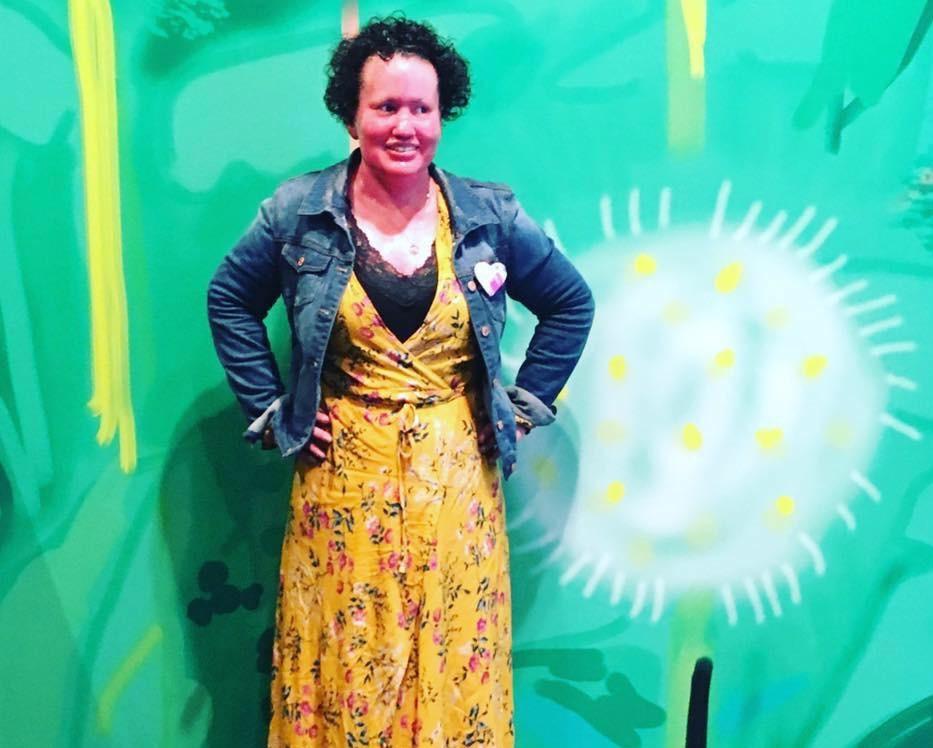
Changing the Perception of My Disability through My Career
My name is Carly. I am a writer, speaker, blogger and appearance activist.
As a child, I never thought I had a disability. I was just Carly with the skin problem. My skin was red and scaly, itchy and painful all my life, and that was that. My parents did a great job with my treatment, but I didn't feel I was treated any differently. I still had to do jobs for pocket money and I was sent to a mainstream school.
Disability - or handicap in the 80s - was only used in their context of receiving support for my creams from Social Security. It wasn't a word I associated with my severe genetic skin condition: Ichthyosis http://carlyfindlay.blogspot.com.au/p/what-is-ichthyosis.html
I think if I did identify with having a disability then, it would have been easier to speak up about what I needed - especially at school. It might have meant that I could sit in the library instead of outside in the heat watching sport. It might have meant I could wear long pants instead of my school dress with bare legs, exposing me to heat, infections and allergies. It might have meant (but probably not) kids would have been a little kinder.
It was only when I reached my mid 20s that I realised I had a chronic illness, and a few years later that I identified as having a disability. I realised that while I have a different chronic illness and disability to my friends and colleagues, I saw that the experiences of barriers of and discrimination faced, plus time taken from work due to hospital appointments and admissions were things we have in common. According to the social model of disability http://www.scope.org.uk/about-us/our-brand/social-model-of-disability, it's society that disables us, not our medical conditions. Now I say I'm a proud disabled woman at the start of my speeches. Disability is a proud part of my identity.
I never saw myself as being disabled because disability had negative connotations, and also limited and severe diagnoses. I also think it is because back then, we rarely saw it portrayed fairly - if at all - in the media.
When I grew up in the 1980s and 1990s, there were very few people with disability in the media. The only ones I can think of were a few on TV: Tracie Sammut who played Donna on GP (Tracie has Down Syndrome), people who acquired disabilities on the road safety ads, and characters who acquired disabilities and then miraculously walked on their wedding day (think Angel - Melissa George - marrying Shane - Dieter Brummer - on Home and Away).
The reporting of disability in the media, and inclusion of people with disability in film and television, portrays disability as either tragic or heroic. News reports show disabled adults as burdens on their parents - not showing their point of view http://www.abc.net.au/news/2016-12-12/at-home-with-the-hilliers-caring-for-adults-with-disabilities/8098976. Murderers are often excused or given lenient sentences because their victims are disabled - and the online commenters often sympathise with the murderers http://www.smh.com.au/lifestyle/news-and-views/opinion/the-murder-of-disabled-children-can-never-be-justified-20161020-gs6xog.html. I'm asked to take part in voyeuristic, sensationalist media like the TV show Body Bizarre regularly. I decline, explaining the problems with shows like these to the producers, then writing about it on my blog http://carlyfindlay.blogspot.com.au/2015/10/the-public-gaze-on-being-invited-to-be.html. I say no, I'd rather do it my way. Social media videos depict overcoming disability - teens with disability taken to the prom (senior formal) by a non disabled classmate out of pity, purely for viral video potential https://disabledidentity.wordpress.com/2016/04/27/pity-and-the-prom/. People lap this up. But what does it say about people with disability? That we're burdensome, exist for audience entertainment and only asked out to dances to make other people feel good about themselves.
We must change that perception of disability, and we can!
In more recent years, especially with the rise of self story telling on social media, we see more people with disability take control of the way our stories are told. We blog, tweet, create Facebook posts, make podcasts, and discuss and mobilise around disability issues across with social media friends across the world. Many people with disability write for or appear in mainstream media - changing the narrative and perception of disability.
I'm one of those people - using my blog to share my experiences, and social media to discuss issues around disability. I've written about the pain my skin condition causes me http://carlyfindlay.blogspot.com.au/2016/08/this-is-what-my-disability-looks-like.html, discrimination by taxi drivers http://carlyfindlay.blogspot.com.au/2013/07/discriminatory-abuse-from-taxi-driver.html (and changed the training for dri vers), media representation http://carlyfindlay.blogspot.com.au/2016/06/me-before-you-disability-as-tragedy-and.html, the misuse of my photo on Reddit http://carlyfindlay.blogspot.com.au/2013/12/how-to-win-internet-or-how-to-defend.html, my wedding http://carlyfindlay.blogspot.com.au/2016/05/our-wedding-day-video.html and more. I post photos of my outfits on Instagram, tagging in brands, to show that yes, people with disability enjoy fashion. My blog has led to publication in mainstream media, and I've connected with countless others with Ichthyosis, facial differences and disabilities. People write to me to say they felt alone before they found my writing, or that my story about living successfully as an adult with Ichthyosis gives them hope for their child, or that they see disability differently thanks to my writing and shares of articles on social media. In 2015 I organised Australia's first Ichthyosis meet http://carlyfindlay.blogspot.com.au/2015/05/all-about-australian-ichthyosis-meet-so.html, bringing together 75 people - 25 of those have Ichthyosis. I've also given people with Ichthyosis and facial differences a space to tell their stories on my blog. It's very rewarding.
I never thought my disability - the thing I never saw as a disability - would be what my career is based on now. It's good to be one of many people helping to reshape the media.



